Some mourners sought to carry Shireen Abu Akleh’s casket on foot, sparking violence; Abu Akleh, 51, killed during Jenin clashes, was widely beloved by Palestinians
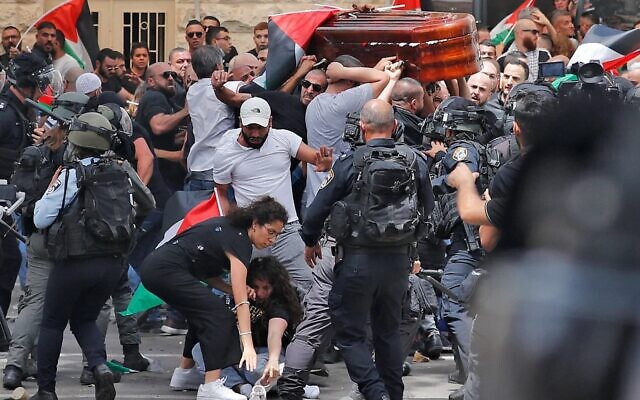
Israeli police violently dispersed an attempt by Palestinians to carry the casket of deceased journalist Shireen Abu Akleh on foot to the Old City as thousands arrived to grieve for the widely beloved correspondent on Friday. Cops used clubs against some of those around the casket, which almost fell, and fired stun grenades to disperse the crowd.
The police said in a subsequent statement that it intervened because rioters took her casket at the hospital against her family’s wishes, and prevented it from being loaded onto a hearse, as previously agreed, for that part of the funeral procession.
Over ten thousand Palestinians paid their respects to Abu Akleh — killed during a firefight early Wednesday between Israeli troops and Palestinian gunmen in Jenin — during a long, tense funeral that wound across the city from Sheikh Jarrah to the Mount Zion cemetery.
The clashes at Saint Joseph’s Hospital erupted after Palestinians sought to carry Abu Akleh’s coffin on foot, waving several Palestinian flags, to the Old City. Police had designated that the procession would begin at the Jaffa Gate, less than two miles away.
A group of Palestinians at the hospital seized Abu Akleh’s casket in an attempt to begin the impromptu march, beating the hearse that would take her to the Old City with sticks, according to The Washington Post. Abu Akleh’s brother Anton reportedly sought to calm the crowd and have them return his sister’s body to the hearse.
“For God’s sake, let us put her in the car and finish the day,” he was quoted as saying.
The crowd seized the coffin, leading the Palestinians gathered in the hospital square to cheer, carrying her casket forward. After a brief standoff, officers rushed the crowd, beating mourners and firing stun grenades into the crowd, which almost toppled to the ground.
“Israeli Police intervened to disperse the mob and prevent them from taking the coffin, so that the funeral could proceed as planned in accordance with the wishes of the family,” police said in a statement on Friday night.
Israel Police later said that that six people had been detained after riots “that had included stone-throwing.”
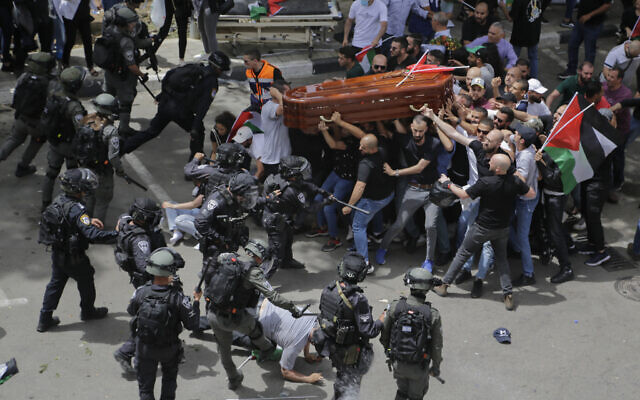
Video released by Israel Police showed at least one Palestinian hurled an object at Israeli officers before the dispersal began. The footage then showed Palestinians throwing objects at police after officers had moved to disperse the crowd.
“They brutally attacked us because we bore the Palestinian flag and we wanted to carry her on our shoulders [to the Old City],” said one Palestinian witness, who spoke on condition of anonymity.
The Palestinian Red Crescent emergency service reported that its medics had treated 33 Palestinians for injuries during the funeral; six were hospitalized.
Abu Akleh’s body was taken by van, surrounded by a police escort, to the Greek Melkite Church near Jaffa Gate. Officers tore Palestinian flags off of the van as well before escorting it to the ancient sanctuary, according to footage.
Police also released a video of a commander warning the crowd that he would not allow the procession to go ahead if they kept singing “nationalist and inciting chants.”
Tensions ran high in the Old City, with thousands packing into the small alleyways and square near the church. Some Palestinians waved Palestinian flags and threw objects at police. Others chanted slogans calling to “let the olive branch fall and raise the rifle,” a reference to a famous speech by the late Palestinian leader Yasser Arafat.
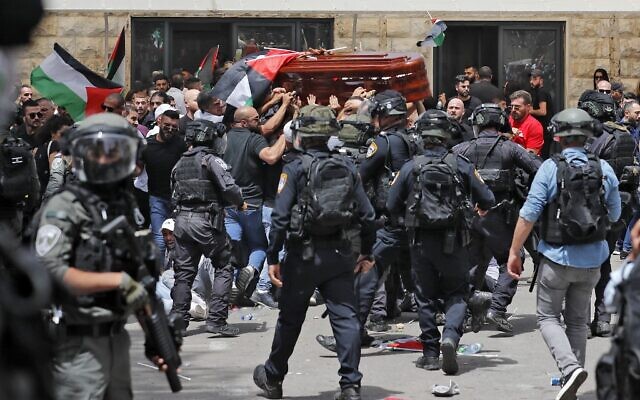
When Abu Akleh’s casket emerged, a rush of mourners surged forward to carry her to her final resting place at Mount Zion. Thousands joined the procession, crossing police roadblocks while officers watched. Palestinians threw flower petals along her casket’s path.
At the cemetery on Mount Zion, an Israeli police helicopter buzzed overhead, the beating of its rotors clashing with the resounding, tolling church bell announcing Abu Akleh’s death.
As the afternoon sun beat down in the cemetery, some mourners chanted slogans. But most stood silently, or wept, repeating to their friends in shock that they would never again see Abu Akleh.
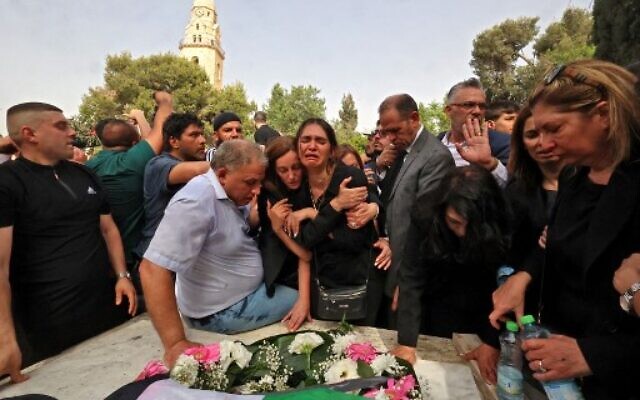
“I was in total denial. I was glued to my Whatsapp as the news came in, trying to figure out what happened. It’s a human tragedy. It’s incomprehensible,” said Walid Nammour, a family friend.
When Abu Akleh’s body was laid to rest, the crowd burst into repeated rounds of applause — honoring her work in death, as in life.
“She was a Palestinian icon. She told our story to the whole world. She gave us everything she had to give,” said Arif Hammad, a resident of East Jerusalem’s Sheikh Jarrah neighborhood.
Regional Cooperation Minister Issawi Frej of the dovish Meretz party accused police of “desecrating the memory and funeral.”
“It was the police violence and zeal to remove every Palestinian flag, contrary to the directive of the Minister of Internal Security, that led to an unnecessary flare-up,” he said.
“The police showed zero respect for the mourners and zero understanding of her role as someone who believed in maintaining order, not in violating it,” Frej said.
The police’s conduct was also lambasted by lawmakers in the US.
“This is awful to watch,” said Democratic Sen. Chris Murphy. “I’m traveling in Connecticut today, but I have my team working to get answers about what happened here.”
“Agree,” Democratic Sen. Chris Van Hollen chimed in. “This simply adds trauma on top of a tragedy. Need immediate accountability for these attacks on people mourning the death of American journalist Shireen Abu Akleh. And her killer must be brought to justice.”
“This is sickening. Violent racism, enabled by $3.8B in unconditional military US funds. For the Israeli apartheid government, Shireen’s life didn’t matter – and her dehumanization continues after death,” tweeted Democratic Rep. Rashida Tlaib, calling on the State Department to issue a condemnation.
An impromptu funeral procession was already held for Abu Akleh in Jenin on Wednesday, as well as a state memorial in Ramallah led by Palestinian Authority President Mahmoud Abbas the following day.
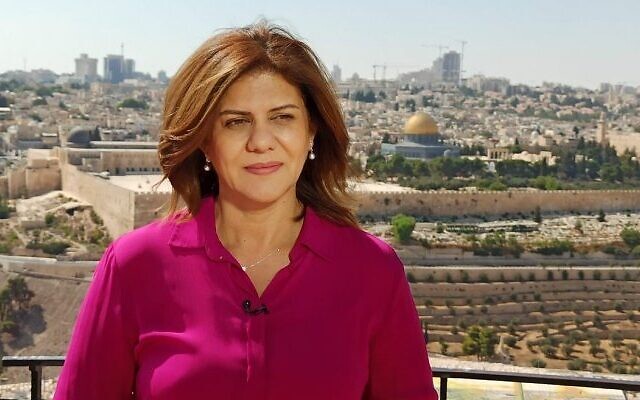
Abu Akleh, 51, was one of the most beloved Palestinian journalists working in Arabic media. A longtime correspondent for the pan-Arab network Al Jazeera, many also saw her as a trailblazing model for women in a field dominated by men.
Her death touched a chord among the Palestinian public, which has been in a state of collective shock and mourning over the past two days. A constant presence in Palestinian homes since the Second Intifada, Abu Akleh was renowned for her reporting from the field.

“She was one of us. She touched everyone. When she died, I couldn’t work, I just went home. Whenever I hear her name now, I cry,” said Amer, an East Jerusalem Palestinian, who declined to be identified by his last name.
“We came to know her during the Second Intifada, the Al-Aqsa Intifada, in those difficult days. She entered every Palestinian home,” he added.
Abu Akleh left for Jenin on Wednesday morning to cover clashes between Israeli troops and Palestinian gunmen. She was shot in the head while wearing a press vest, with Israeli and Palestinian authorities providing different accounts of who killed her.
Palestinian witnesses and officials said Israeli soldiers killed Abu Akleh. Israeli officials at first said it was likely Palestinian gunmen had mistakenly shot her, but later said errant Israeli sniper fire could also have caused her death.
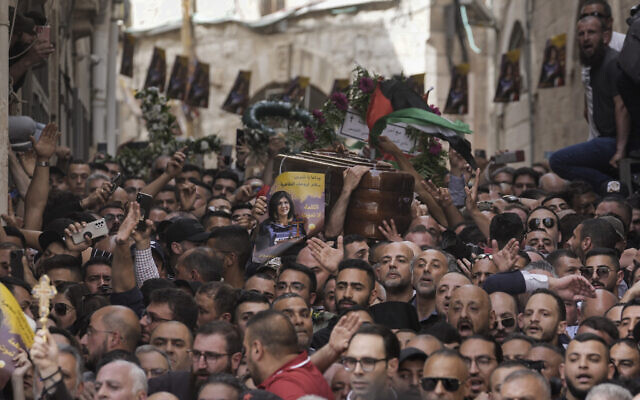
In a video recorded by Al Jazeera to celebrate the channel’s 25th anniversary, Abu Akleh said she became a journalist “to be close to people.”
“It might not be easy to change reality. But at least I was able to bring their voice to the world,” Abu Akleh said.

